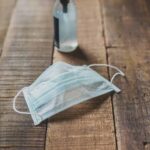Period poverty is prevalent on a global scale. Young women have suffered throughout history to manage menstruation safely and hygienically. Poor menstrual hygiene leads to health complications and disease. The stigmatization of menstruation causes shame and prejudice. Limited free sanitary products for school and facilities mean that many girls remain absent from school during their periods. This is an issue which is compromising the health, education and social security of girls and young women.
Feminine hygiene in third world countries
Menstrual hygiene is particularly a problem in countries that lack of access to feminine hygiene products and spaces. These places have limited access to sanitary products, private and hygienic spaces in which to use them, and educational resources on menstruation. According to UNESCO, Kenya around 80 per cent of the country’s population do not have access to safely managed sanitation. Furthermore, approximately 50 percent of school-age girls do not have access to free sanitary products and towels. Consequently, poor menstrual hygiene and management in Kenya causes discrimination, shame, and stigmatisation towards young women.
Are sanitary pads taxed in Kenya?
Although Kenya has implemented progressive menstrual policies, however sanitary pads crisis remains widespread. The government reduced value added tax on pads and tampons in 2004 to lower the price consumers pay. And since 2011, the government has been budgeting around $3 million per year to distribute free pads in schools in low-income communities.
Learn more about the free sanitary pads for schoolgirls article.
In addition, the success of this program is limited if schools do not have supporting infrastructure such as separate bathrooms for girls. In rural areas of Kenya, only 32% of schools have a private place for girls to change their sanitary products. Columbia University professor Marni Sommer, who studies adolescent health in sub-Saharan Africa,
also notes that:
“While products and materials are essential, you can’t manage your period if you don’t understand what is happening to your body and don’t have basic information about reproductive health.”
How can we stop period poverty?
This is where African Development Choices have an opportunity to make constructive inroads regarding period poverty in Kenya. The charity’s three-step approach to development in Africa centres around public participation and empowerment. A solution for reducing poor period hygiene effects is to establish an open dialogue between girls and community leaders. In other words, we can help to identify local priorities and the resources required to manage menstruation hygiene in a safe manner. Likewise, public participation also sets a precedent for the better management of resources. Nevertheless, communities have to play an active and informed role about the spending of resources on local services.
Read this article on the importance of the community engagement lead.
Period education
Empowerment also comes from education. According to period poverty statistics only 50% of girls discuss menstruation at home, and 12% of girls in Kenya would be comfortable receiving the information from their mother. A solution to raise menstrual health awareness would be by initiating educational projects and workshops on period poverty in schools and local communities. Also, we can create a safe environment where girls can receive information and ask questions about menstruation so that they are better informed about their bodies. Education will allow girls to make informed choices about their period, as well as help to break taboos, dispel myths, and remove shame.
Getting your first period is a frightening and momentous moment in any girl’s life. If you combine this with a lack of basic facilities, including access to sanitary products, clean water, and private toilet facilities, menstruation becomes a burden bestowing health risks and complications, affecting education and well-being, and attracting intolerance, shame and stigma. Which is why we have a responsibility to help communities empower women and girls to manage their periods safely and with dignity.












0 Comments